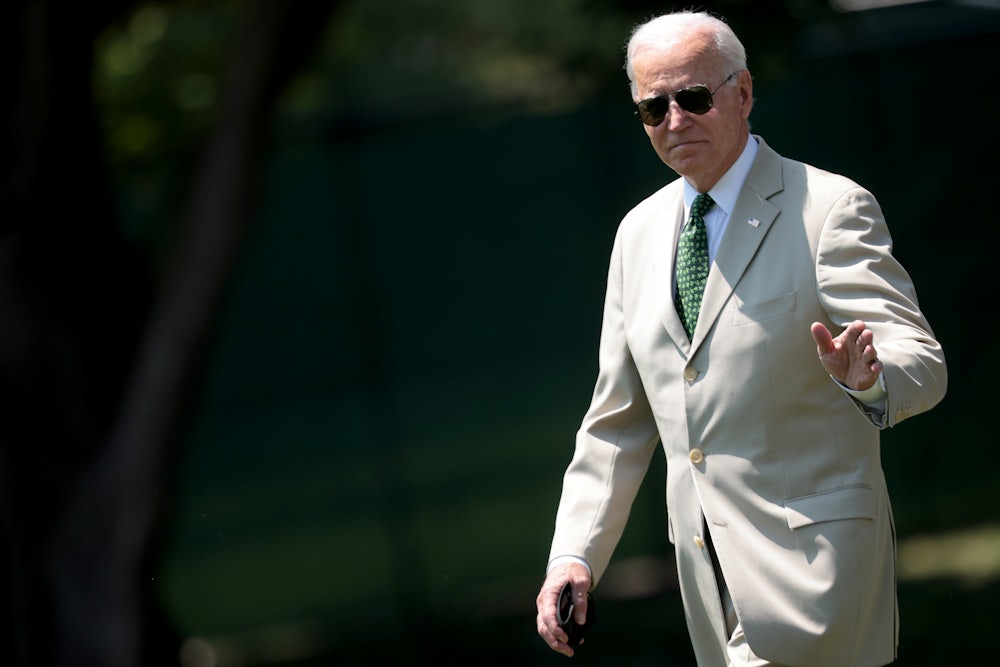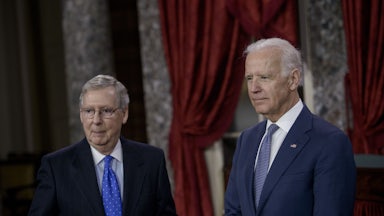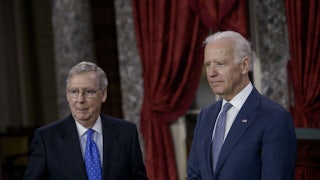Quiz time: What is the current amount of the federal budget deficit?
I’ll give the answer at the end of this column. For now, what you need to know is that it’s massive. Like, yuge. It’s pandemic-related, of course; it’s not even all Donald Trump’s fault, although his tax cuts for corporations and the rich didn’t help.
I ask because something fascinating and nearly unprecedented, at least in terms of our recent political history, just occurred. The Senate is about to pass the infrastructure bill. And as you may have heard, the Congressional Budget Office said last Thursday that the bill would add more than $250 billion to the deficit over 10 years. And what happened? Nothing. Nobody batted an eye.
This is a major and very encouraging development in our politics. In the Ronald Reagan era, which, as Michelle Goldberg has argued, lasted from 1981 until this year, Democrats have been absolutely terrified of deficit politics. Terrified.
Here’s the history: When Bill Clinton took office, the deficit was his chief preoccupation. There is a famous story about how he convened his economic team in Little Rock about three weeks before being inaugurated. The day before, in an obvious effort to induce an atmosphere of panic at the meeting, George H.W. Bush’s budget director announced that future deficits were going to be larger than anticipated.
Clinton had campaigned on some ample public investments under the rubric “putting people first.” But at this meeting, advisers led by Robert Rubin counseled that he’d better put the bond market first, which meant attacking the deficit. Against the advice of more liberal advisers like Gene Sperling, he acquiesced.
In the end, the strategy worked out fine economically overall—jobs and median household income grew more under Clinton than any other postwar president. The budget deficit was turned into a $246 billion surplus by the time Clinton left office. But liberals were always miffed that Clinton put the needs and wants of Wall Street first.
That’s the short version of how the Democratic Party reached its state of near abject paranoia about the deficit. Barack Obama famously settled for a smaller stimulus than was necessary, on the advice of Larry Summers and pretty much his entire political team, out of the closely related fear of being called a big-spending liberal. It’s been even worse among congressional Democrats. I’ve heard stories over the years. They’re terrified of proposing anything that isn’t fully paid for.
Meanwhile, the Republicans have reliably run up the deficit every time they’ve held power. Remember when Dick Cheney said that “deficits don’t matter”? He was talking with George W. Bush’s treasury secretary, Paul O’Neill, who was warning of a looming fiscal crisis because of the tax cuts and the off-the-books war spending. The full Cheney quote was: “You know, Paul, Reagan proved that deficits don’t matter. We won the midterms. This is our due.” The next month, Cheney told O’Neill he was fired.
Republicans are the ones who’ve been irresponsible about the deficit; the facts are clear. They increase it intentionally. The idea is to cut taxes for the rich (which is more or less the only domestic policy position the party has) and run up the deficit so that if and when a Democrat wins the White House and actually wants to do some stuff, they can make a timely about-face and start yapping about how the tax-and-spend Democrats are going to run up the deficit and make your great-grandchildren foot the bill. It has worked like magic for 20 years. Sorry, no: 40 years.
Throughout that time, Americans have still called the Republicans the fiscally responsible party in poll after poll! It’s just hard-wired in people’s brains because the Republicans spend so much time howling about the Democrats and the deficit.
But over the last couple of years, public opinion has started to shift. Americans are less concerned about the deficit than they used to be. A Pew poll from about a year ago found that the number of people who said the deficit is a “very serious” problem fell from 55 percent to 47 percent over a two-year period.
Why? Because when Covid-19 hit, people wanted the government to intervene and spend. You know how they say everyone finds God in a foxhole? Well, by the same token, during a serious economic crisis, everyone finds Keynes.
When that CBO number came out last week, I gasped. Everything about this country’s recent political history suggested that the Republicans necessary for critical cloture votes would use the number as an excuse to jump ship. Not this time: Rob Portman, the chief Republican negotiator, put out a statement saying eh, no big deal.
This sea change is more important than the infrastructure deal itself, salutary as that is. It’s not that Democrats are suddenly going to become devil-may-care about spending. They never have been that. Not even FDR was that cavalier: As you may recall, he pivoted after his 1936 reelection to deficit reduction, setting back the recovery that was underway. Joe Biden has, from time to time, paid lip service to caring about not increasing the deficit.
But beneath the surface, he is changing the politics of deficit hawkery. This is all to the good: A running budget deficit that isn’t too large is fine. Democrats should embrace this. Deficits and debts are normal. I have them. They’re called my mortgage and my car loan. When Republicans say that the federal government should be run like a business, remember: Those businesses pack on debt, too.
Nearly everyone has them. And that’s absolutely fine. When you take out a loan to redo your kitchen, you’re engaging in deficit financing. But you’re helping the local economy by purchasing cabinets and hiring installers. This isn’t too complicated to explain to people in a way that makes common sense.
By the way, today’s deficit? It’s $3.2 trillion. Way, way higher than it’s ever been. And I bet you haven’t lost a night’s sleep over it. Don’t start now.








